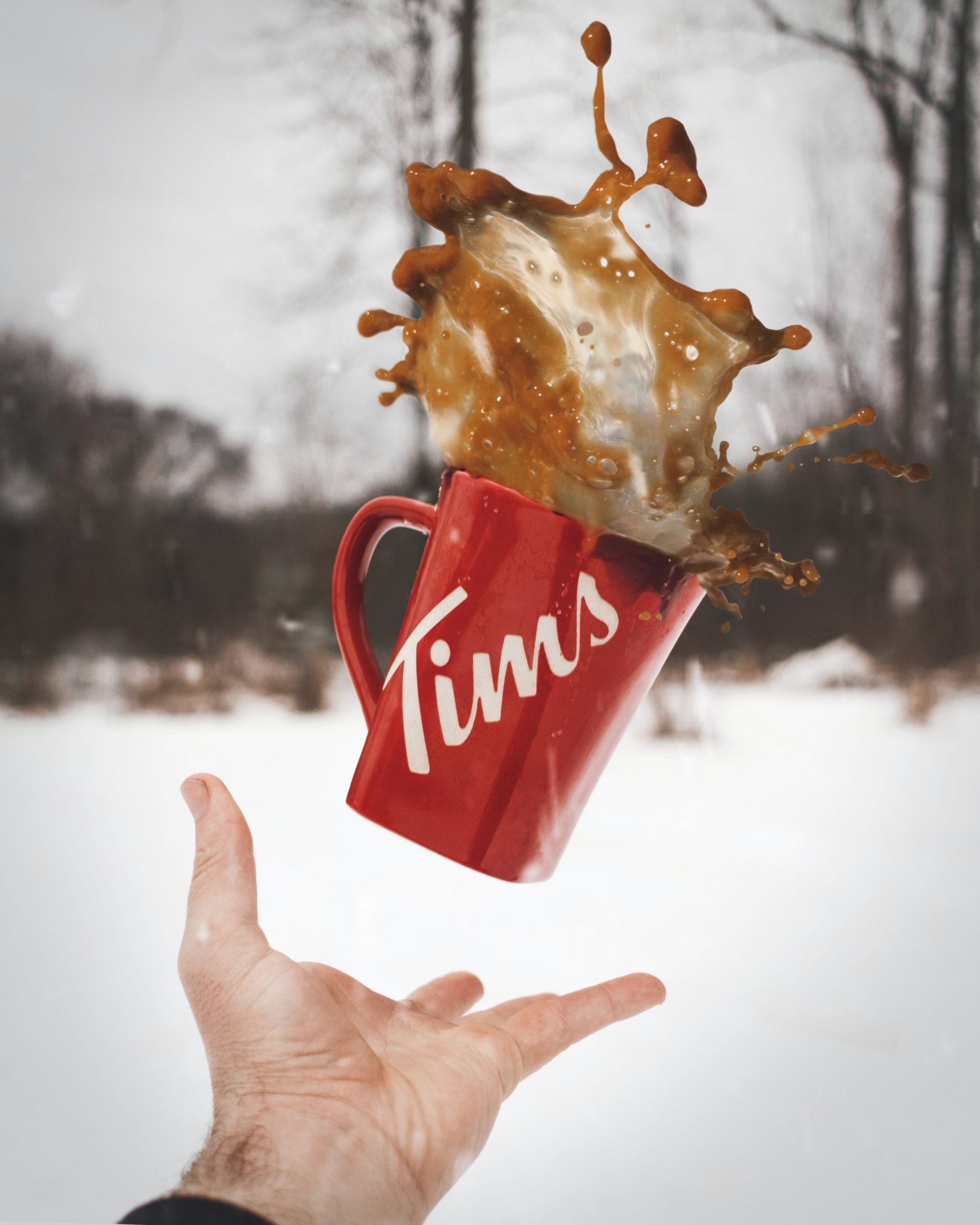Tim Hortons and Timbiebs
Tim Hortons is as Canadian as it gets. Founded by former Toronto Maple Leafs’ player Tim Horton in 1964, this coffee, donut, and quick eats company grew from a small fast-food restaurant in Hamilton, Ontario, to spread across the country. Now, you’ll find Tim Hortons location everywhere, from New York City to Shanghai. They are a maple leaf adorned symbol of Canada, a fast-food chain very closely associated with the place it came from. They partnered with a similarly identifiable Canadian icon for their latest major promotion: Justin Bieber.
The product of Justin Bieber, the world-famous Canadian pop sensation, and Tim Hortons was new mini donuts which were a play on the brand’s famous Timbits, bite-sized donut circles. Bieber and Tim Hortons collaborated to create Timbiebs, new flavors of Timbits that were supposedly the product of Bieber’s own flavor selection. They also released a line of merchandise customers could purchase with their Timbiebs.
Timbiebs were rolled out in a quick and effective marketing campaign. First, Tim Hortons released a video announcing the collaboration that featured Bieber. It racked up hundreds of thousands of views on YouTube and was promoted on their social media platforms. The announcement post of the collaboration generated nearly 6,500 likes and 1,700 retweets, far above the standard numbers for a Tim Hortons social media post.
Immediately upon release, Timbiebs was trending on social media and attracting customers to Tim Hortons. While some would say it was for the three new flavors, which were Chocolate White Fudge, Sour Cream Chocolate Chip, and Birthday Cake Waffle, Tim Hortons releases new flavors all the time, mostly to little fanfare.
Timbiebs spawned YouTube videos of customers’ taste testing the flavors, “unboxing” the packaging, and creating vlogs about whether they are “worth the hype.” All this secondary user-generated content is free marketing for Tim Hortons to go along with the large campaign they released that had Justin Bieber at the center.
Beyond social media posts, the Timbiebs merchandise that Tim Hortons released has found a serious home on the secondary market. People are selling (and buying) everything associated with this campaign. Looking online, you can find empty Timbiebs boxes being sold at massive markups, along with hats and fanny packs that are receiving bids at over 500% markups. While Tim Hortons doesn’t receive money from this, people are legitimately interested in wearing Tim Hortons apparel right now, which is more free marketing.
Tim Hortons has had to restock the merchandise, which has sold for thousands of dollars. The donuts themselves are also a hot commodity, and the campaign is an unequivocal success for the brand.
The Power of an Effective Celebrity Marketing Campaign
The Timbiebs campaign is an example of an extremely effective influencer marketing campaign. Tim Hortons partnered with a major celebrity who fit their brand’s identity, invested heavily in promoting around the influencer, and saw a frenzied reaction from fans. Justin Bieber is someone with legions of devoted fans worldwide; anything even associated with him is going to get buzz. To put him front and center in this campaign, especially for a great product fit, was a surefire success.
Tim Hortons is hardly the first brand to do this. Celebrity endorsements have been a staple of the marketing industry since its inception. However, Timbiebs is an example of the newer form of marketing that gives celebrities a heightened influence and centers the product around the influencer.
Another similar example is when Mcdonald’s released their Cactus Jack burger, which was centered around rapper Travis Scott. This went viral on social media and brought legions of fans to McDonald’s doorsteps. McDonald’s then did the same thing for BTS, the K-Pop global phenomenon. They made the BTS Meal, a “collab” with the group that went worldwide. It was massive, even leading to an Indonesian McDonalds branch being shut down due to unmanageable demand.
This is proof of concept for the massive power that mega-influencers wield. A new Timbit flavor or McDonald’s burger will get minor attention, but attach a global superstar to it, release merchandise, and effectively market, and you might have a phenomenon on your hands. While every business won’t afford a Travis Scott, Justin Bieber, or BTS, businesses have access to a wide range of different social media stars through social media.
One of the important takeaways of the Timbiebs campaign, beyond just how impactful an influencer endorsement can be, is the power of an influencer-brand partnership. The more involved the influencer is, the more authentic their connection to the product appears to be.
Utilizing social media to form sponsorships can yield significant results for your business. They don’t have to be a global pop star; they just have to be someone with a large follower base invested in what they say. Many businesses have achieved growth by using a micro-influencer marketing agency to partner with smaller influencers. It isn’t just about the size of the influencer; it is about how they are utilized.
If you are looking to partner with an influencer marketing firm to help you launch your next campaign, Influence Hunter might be the team for you. Influencer Hunter is a top influencer marketing agency with years of experience helping clients achieve strategic growth through customizable social media campaigns. If you’re ready to launch your influencer outreach into the stratosphere, contact us today.


Comments are closed